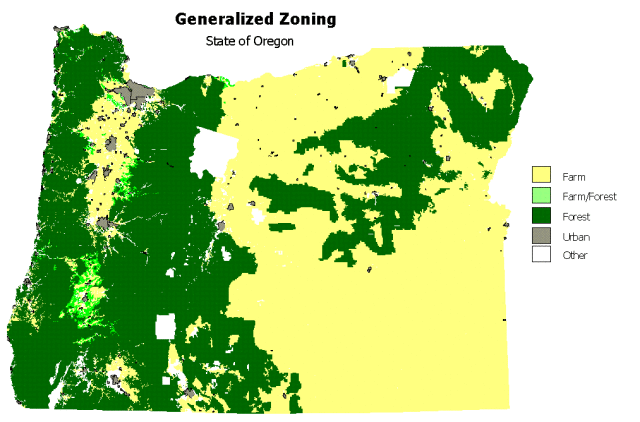Marijuana Zoning in Oregon: All Over the Board

But if it’s all about location, location, location for these businesses, then it must all be about zoning, zoning, zoning, as well. So, check out the great food for thought posted below.
-Justin Runquist
We regularly get calls from clients in Oregon who are trying to figure out whether the property they’ve selected for their recreational marijuana business complies with applicable zoning regulations. Unfortunately, it is not yet clear what zoning regulations pertaining to recreational marijuana businesses will look like, because much of this regulation is left to individual cities and counties. Aside from designating sensitive uses such as schools, parks and transit centers, and then mandating a buffer zone (likely 1,000 feet) for marijuana businesses, the state of Oregon does not tend to involve itself extensively in zoning regulations
Though Initiative 91 does not allow cities and counties to issue unilateral bans on recreational marijuana businesses without first putting the issue to vote, the Initiative also does not preclude cities and counties from enacting their own zoning ordinances. The severity with which cities and counties utilize zoning ordinances to regulate marijuana businesses may be inferred by their past and current treatment of the medical marijuana industry.
Take Washington County as an example. Until just last year, Washington County had a moratorium in place against medical marijuana businesses. Effective in November of last year, the county enacted a new ordinance requiring marijuana business owners acquire a special use permit in certain zones, including the Community Business District, General Commercial District, Rural Commercial District, Transit Oriented Districts, and the Neighborhood Commercial Mixed Use District.
Special use permits are another way — in addition to zoning regulations — for cities and counties to tightly regulate where marijuana businesses may locate. The criteria for obtaining these permits are contained in each city and county’s code. The application process for a special use permit gives the local zoning authority discretion to ensure that a particular land use, such as marijuana production or marijuana retail sales, does not adversely affect the existing zoning scheme.
Taking regulation to the next level, as of January 1, 2015 the city of Beaverton in Washington County began issuing its own licenses for medical marijuana facilities in addition to the requisite state license. The city also established a recreational marijuana tax, though that will likely be subject to limitation by the state legislature.
The most common types of regulations we see from Oregon cities and counties, such as Clackamas County, are time, place and manner restrictions. These restrictions may include limitations on hours of operation, restrictions on signage or the outside appearance of a business, and restrictions on a business’s proximity to certain sensitive uses. Note that some counties, including Clackamas, have already contemplated recreational marijuana businesses in their current zoning regulations, making it easier for prospective business owners to get a good idea of where they will be able to locate.
At the opposite end of the spectrum from Oregon’s tightly regulated cities and counties is Multnomah County, which currently has no zoning restrictions pertaining to medical marijuana. Marijuana businesses within Multnomah County are being left to be regulated city by city. The City of Portland, for example, has no current zoning restrictions, though we expect this may change with implementation of Initiative 91.
One thing that is clear is that marijuana zoning regulations in Oregon are all over the board. Most importantly, current and prospective marijuana business owners should be communicative with local government officials. We are finding that most members of local planning departments in Oregon are happy to help business owners (and even us lawyers) navigate local regulations. Subscribing to local government newsletters and attending city and county council meetings are key, not just for staying abreast of updates to the rules, but for ensuring that your interests are taken into account during the rule-making process.
For more on the importance of staying current on local rules and regulations, check out Cannabis Businesses Laws: It’s Almost All Local.
– Alison Malsbury on June 16, 2015
